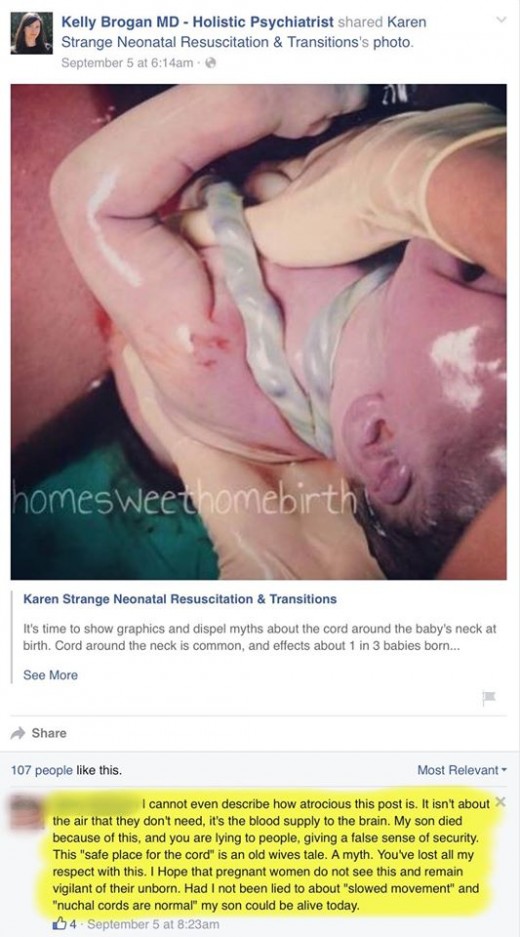Kelly Brogan, “holistic psychiatrist,” and a charter member of the Quack Pack (along with Bob Sears, Aviva Romm, and other physicians who promote pseudoscience) recently shared a thoroughly misleading Facebook post about nuchal cords.
Natural childbirth and homebirth advocates get very excited about nuchal (neck) cords, the medical term for an umbilical cord that gets wrapped around the baby’s neck. They get excited because they believe that obstetricians dramatize the risk of nuchal cords (“the baby could die”) when they aren’t dangerous at all. That claim is a deadly lie. It’s bad enough when a layperson makes a deadly claim, but it’s truly inexcusable when a physician offers misleading, potentially deadly information.
[pullquote align=”right” color=”#1e6e19″]10-15% of stillbirths are associated with problems like nuchal cords and true knots.[/pullquote]
How does an umbilical cord get wrapped around the baby’s neck in the first place? For most of pregnancy, the baby has a lot of room to move and the cord is relatively long. Moving around, up and down, and somersaulting, the baby can easily get the cord wrapped around itself. Most of these loops will slip off at some point, generally without causing a problem.
Contrary to popular belief, the danger of a nuchal cord has nothing to do with the fact that it is wrapped around the baby’s neck. Since the fetus does not breathe, compressing its neck has no impact on whether there is adequate oxygen in the blood. In other words, the effect of neck compression is fundamentally different than if the neck of a child or adult is compressed.
In order to understand the danger of a nuchal cord it helps to think of the cord as similar to the air line of a deep sea diver. It’s easy to understand that if a diver moved around such that he wrapped his air line around an object, it could pose a serious problem. If the air hose isn’t pulled tight, there is no problem. The oxygen can pass easily through the loop. However if the air hose gets pulled very tight, the diameter of the hose could narrow and, supply of oxygen can get cut off, and the diver could die as a result.
Similarly, a loose true knot in the umbilical cord is not a problem for the fetus because the oxygen continues flowing through the loop. However, if the knot gets pulled tight, either by the cord being pulled as the baby descends into the pelvis or the cord getting pulled by being snagged on an arm or leg, the baby will be deprived of oxygen and die.
That’s not what the piece by Karen Strange that Brogan linked to says.
It also is frequently misunderstood to be dangerous, which is a problematic myth – if occurs so commonly, how did humans ever survive as a species?
Gee, it’s probably the same way we survived as a species despite the fact that the natural miscarriage rate is 20% and most women will have a miscarriage during their reproductive years. Population increases as long as couples have more than 2 surviving children. They could have 3 or they could have 10, 7 or whom have died. The population increases by the same amount either way.
The truth is the cord around the baby’s neck is NOT harmful, as it does NOT strangle a baby who is NOT using lungs to breathe until AFTER birth.
As it typical of most natural childbirth/homebirth “information,” it is a half truth. Not all nuchal cords are dangerous. Only tight nuchal cords are dangerous, but according to what passes for “reasoning” in the natural childbirth community, if 100% of nuchal cords don’t end in death, then 0% of nuchal cords are dangerous. It’s the equivalent of claiming that since not buckling your seat belt doesn’t have a 100% death rate (or anywhere close), not buckling your seat belt is therefore safe and that anyone who suggests you should buckle your seatbelt is a fearmongerer.
Of course a tight nuchal cord doesn’t strangle a baby. It kills by depriving the baby of oxygen.
What proportion of babies die from nuchal cords? You won’t find that information anywhere because neither Brogan nor Strange appears to know. They don’t tell you that 10-15% of stillbirths are associated with cord problems like nuchal cords and true knots. Without that information, anything they say on the topic is worse than worthless.
Does Brogan care that she is transmitting and amplifying misinformation? Apparently not.
If a mother refuses a recommended emergency C-section because Brogan convinced her that a nuchal cord is not a problem and that baby dies, will she be offering compensation for the mother’s anguish? How about if her baby survives but sustains a serious brain injury due to a tight nuchal cord? Does Brogan plan to donate the millions of dollars it will take to provide appropriate care for that child? Or will she simply ignore those who suffer and die from her misinformation and keep right on peddling it?
Does she plan to take ANY responsibility if a baby dies from the misinformation that she endorsed?
No. You can bet your baby’s life on it.



